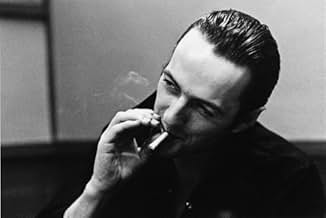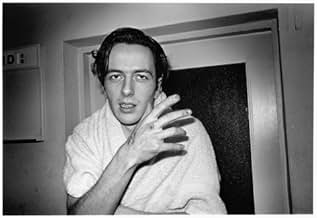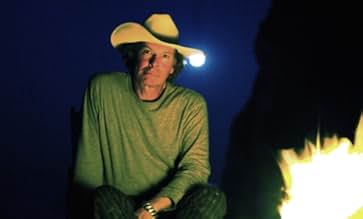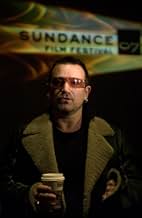IMDb RATING
7.5/10
4.3K
YOUR RATING
As the front man of the Clash from 1977, Joe Strummer changed people's lives forever. Four years after his death, his influence reaches out around the world, more strongly now than ever befo... Read allAs the front man of the Clash from 1977, Joe Strummer changed people's lives forever. Four years after his death, his influence reaches out around the world, more strongly now than ever before.As the front man of the Clash from 1977, Joe Strummer changed people's lives forever. Four years after his death, his influence reaches out around the world, more strongly now than ever before.
- Awards
- 1 win & 4 nominations total
Joe Strummer
- Self
- (archive footage)
The 101ers
- Themselves
- (archive footage)
Brigitte Bardot
- Self
- (archive footage)
Mark 'Bez' Berry
- Self
- (as Bez)
Big Audio Dynamite
- Themselves
- (archive footage)
The Clash
- Themselves
- (archive footage)
Peter Cushing
- Winston Smith
- (archive footage)
Featured reviews
Joe Strummer: The Future is Unwritten is maybe the first time one has seen a documentary done a "punk rocker" like this, where it's a story of the ups and downs and valleys and little peaks for a rock star done in the style of Eisenstein caught in the midst of a room covered with punk garb and an assistant with a mohawk. It mixes archival footage, interviews, movie footage from Animal Farm and 1984, Peter Cushing movies and Raging Bull, as well as a kind of loose structure formed out of 'London Calling' radio clips that Strummer did with his own music choices for his audience, and it's a mix that the suits the director wonderfully. His previous film was a revisionist take on the Sex Pistols- maybe the masterpiece of punk-rock docs, the Filth and the Fury- and the Future is Unwritten comes just as close to the subliminally, anger, trouble, and creative spirit that went with its subject matter.
Can anyone completely know Joe Strummer? Probably the same could go for Bob Dylan, who also has a movie about him out now that stretches the boundaries of cinema in I'm Not There. Temple raises questions for the fans of the Clash who might've not known certain things; that Strummer could be a very generous front-runner to the fans that needed help, and could also get p-od if his audience wasn't in some check with himself (or rather that they could be connecting with the audience and not some abstract rock-blob, which they feel they become by the time of Shea stadium); that towards the end of the Clash it was just Strummer and his management team (!); that Strummer anguished for the better part of a decade over how his career would go- this part I did know- that he went into some movies, made a horrible effort to get out of his record contract, and drifted in the tide of experiencing whatever for inspiration. His tale is more enigmatic than most, but as any artist he was many things at any time: moody to a fault, pushy, pleasant, quiet, frustrated, quixotic, and always with ideas that could come from anywhere, from Central American rebel uprisings to his walk from one place to another.
It is, more often than not, a sad film, probably more-so than the destructive tome on the Pistols, because Temple brings up many 'what-ifs', and a lot of the loneliness that could encompass Strummer (i.e. the scene when he's recording for days on end by himself in the studio shows him frayed and frazzled, as he sometimes appears in interviews too) and carried around him with, as any major rock and roll personality has, a rotten past and family history (father, brother, et all). But all those moments when Temple gets the audience to really feel the weight of the fact that such a man has been gone for good for five years now, he also reminds us brilliantly what he DID accomplish. There is a mark left from him, on his fans and on his loved ones and on the likes of Bono and Scorsese and (as funny as it is to see him Jack Sparrow-ed up) Depp, not to mention practically any *good* punk band.
Strummer was a thinking-man's punk, one who's lyrics could be taken into context of political and social significance, and had the stamina- along with his rowdy band-mates- to try and do what few rock bands could ever do: make a significant impact on consciousness, as if it were intuitive to do so. That they were eclectic didn't hurt either (even if, arguably, the Clash were more significant than the Mescaleros could ever be). And, in the end, the Future is Unwritten is mandatory viewing for anyone who gave a g*damn about the Clash or about the progression of the creative forces that started, actually, in folk and hippie music, progressed through punk, and went back out again into techno and, gasp, hippies and punks combined! It's daring for what's in-between the lines of the typical rock and roller story, and how Temple and his team make one of the best edited films of the year.
Can anyone completely know Joe Strummer? Probably the same could go for Bob Dylan, who also has a movie about him out now that stretches the boundaries of cinema in I'm Not There. Temple raises questions for the fans of the Clash who might've not known certain things; that Strummer could be a very generous front-runner to the fans that needed help, and could also get p-od if his audience wasn't in some check with himself (or rather that they could be connecting with the audience and not some abstract rock-blob, which they feel they become by the time of Shea stadium); that towards the end of the Clash it was just Strummer and his management team (!); that Strummer anguished for the better part of a decade over how his career would go- this part I did know- that he went into some movies, made a horrible effort to get out of his record contract, and drifted in the tide of experiencing whatever for inspiration. His tale is more enigmatic than most, but as any artist he was many things at any time: moody to a fault, pushy, pleasant, quiet, frustrated, quixotic, and always with ideas that could come from anywhere, from Central American rebel uprisings to his walk from one place to another.
It is, more often than not, a sad film, probably more-so than the destructive tome on the Pistols, because Temple brings up many 'what-ifs', and a lot of the loneliness that could encompass Strummer (i.e. the scene when he's recording for days on end by himself in the studio shows him frayed and frazzled, as he sometimes appears in interviews too) and carried around him with, as any major rock and roll personality has, a rotten past and family history (father, brother, et all). But all those moments when Temple gets the audience to really feel the weight of the fact that such a man has been gone for good for five years now, he also reminds us brilliantly what he DID accomplish. There is a mark left from him, on his fans and on his loved ones and on the likes of Bono and Scorsese and (as funny as it is to see him Jack Sparrow-ed up) Depp, not to mention practically any *good* punk band.
Strummer was a thinking-man's punk, one who's lyrics could be taken into context of political and social significance, and had the stamina- along with his rowdy band-mates- to try and do what few rock bands could ever do: make a significant impact on consciousness, as if it were intuitive to do so. That they were eclectic didn't hurt either (even if, arguably, the Clash were more significant than the Mescaleros could ever be). And, in the end, the Future is Unwritten is mandatory viewing for anyone who gave a g*damn about the Clash or about the progression of the creative forces that started, actually, in folk and hippie music, progressed through punk, and went back out again into techno and, gasp, hippies and punks combined! It's daring for what's in-between the lines of the typical rock and roller story, and how Temple and his team make one of the best edited films of the year.
A documentary charting the life and untimely death of one of the leading figures in the Punk movement in Great Britain in the late 70s. From pub rock beginnings to filling out stadiums in North America, this film attempts to create an in-depth marker to just what made the Clash front man tick.
First off let me say that I myself consider myself to be one of The Clash, and Strummer's biggest fans. Being around at the time of the Punk explosion, I still to this day, live my life as a Punk in spirit. For sure this is an invaluable film for fans and anybody who's interested in getting involved with Joe and his music, with some of the early footage (to me at least) being quite simply priceless. Yet it's lacking the necessary edge to make it one of music's great documentaries.
Julien Temple (who set the benchmark for rock docs with his brilliant The Filth And The Fury in 2000) tells it well, edits it nicely and gets the tight and trusted friends and colleagues to line up with back slapping praise. You got the likes of Bono, Martin Scorsese, Johnny Depp, Flea, John Cussack and Michael Stipe, all men of substance who certainly don't need to be on this film to make themselves seem cool-so you can rest assured that these guys mean it when they are dishing out the plaudits to one of Punks great fathers. But, and here's the thing with me, the itch that I just can't scratch, why has important periods in The Clash/Strummer's life been given over to so many filled in back slaps? Anyone who knows their Clash history will know of the troubled making of their second album, Give Em Enough Rope, it's not even mentioned here! From The Clash's debut album we lurch forward to London Calling, it's a gap of some distinction I can tell you, and practically unforgivable. I was further annoyed that the new look Clash around the time of Cut The Crap was given about a two minute overview, this was a very critical time in Joe's life, but we basically just get told that, oh Joe was unhappy and the new guys were in awe of him.
This is far from definitive, but as it is, it's probably the only documentary we will ever have on the late great Joe Strummer. So with that in mind I'm truly thankful. But as glad as I am that it exists, I'm equally annoyed that the story has holes that have not been filled because Mr Temple (perhaps wondering just how many people would want to see the picture) has over crammed in the plaudits. 7/10
First off let me say that I myself consider myself to be one of The Clash, and Strummer's biggest fans. Being around at the time of the Punk explosion, I still to this day, live my life as a Punk in spirit. For sure this is an invaluable film for fans and anybody who's interested in getting involved with Joe and his music, with some of the early footage (to me at least) being quite simply priceless. Yet it's lacking the necessary edge to make it one of music's great documentaries.
Julien Temple (who set the benchmark for rock docs with his brilliant The Filth And The Fury in 2000) tells it well, edits it nicely and gets the tight and trusted friends and colleagues to line up with back slapping praise. You got the likes of Bono, Martin Scorsese, Johnny Depp, Flea, John Cussack and Michael Stipe, all men of substance who certainly don't need to be on this film to make themselves seem cool-so you can rest assured that these guys mean it when they are dishing out the plaudits to one of Punks great fathers. But, and here's the thing with me, the itch that I just can't scratch, why has important periods in The Clash/Strummer's life been given over to so many filled in back slaps? Anyone who knows their Clash history will know of the troubled making of their second album, Give Em Enough Rope, it's not even mentioned here! From The Clash's debut album we lurch forward to London Calling, it's a gap of some distinction I can tell you, and practically unforgivable. I was further annoyed that the new look Clash around the time of Cut The Crap was given about a two minute overview, this was a very critical time in Joe's life, but we basically just get told that, oh Joe was unhappy and the new guys were in awe of him.
This is far from definitive, but as it is, it's probably the only documentary we will ever have on the late great Joe Strummer. So with that in mind I'm truly thankful. But as glad as I am that it exists, I'm equally annoyed that the story has holes that have not been filled because Mr Temple (perhaps wondering just how many people would want to see the picture) has over crammed in the plaudits. 7/10
I can't say anything of this movie by Julian... My comment is I want to cry.. I was really touched of the movie The Future is Unwritten.. Hoping for the next movie of Julian... ^_^ More Power.
Joe Strummer was born as John Mellor in Ankara, Turkey on August 21, 1952. His father was a British foreign-service diplomat; his mother, a nurse, was a crofters's daughter from the Scottish Highlands. The family spent much time moving from place to place, and Strummer spent his childhood in a variety of countries. At the age of 9, Strummer and his older brother David, 10, began boarding at the City of London Freemen's School in Surrey. Strummer rarely saw his parents during this time. He developed a love of rock music, listening to records by The Beatles and The Beach Boys, as well as American folk-singer Woody Guthrie (Strummer would even go by the name "Woody" for a few years, until changing his name to "Joe Strummer" a year and a half before the Clash was formed). Strummer was never very close to his brother David, but nonetheless David's suicide significantly changed Joe's outlook on life. After finishing his time in boarding school in 1970 Strummer moved on to London's Central School of Art & Design, where he briefly flirted with the idea of becoming a professional cartoonist. During this time, Strummer shared a flat in the north London suburb of Palmers Green with friends Clive Timperley and Tymon Dogg.
For those who didn't know who is Joe Strummer and for those who haven't seen the movie yet...
Joe Strummer was born as John Mellor in Ankara, Turkey on August 21, 1952. His father was a British foreign-service diplomat; his mother, a nurse, was a crofters's daughter from the Scottish Highlands. The family spent much time moving from place to place, and Strummer spent his childhood in a variety of countries. At the age of 9, Strummer and his older brother David, 10, began boarding at the City of London Freemen's School in Surrey. Strummer rarely saw his parents during this time. He developed a love of rock music, listening to records by The Beatles and The Beach Boys, as well as American folk-singer Woody Guthrie (Strummer would even go by the name "Woody" for a few years, until changing his name to "Joe Strummer" a year and a half before the Clash was formed). Strummer was never very close to his brother David, but nonetheless David's suicide significantly changed Joe's outlook on life. After finishing his time in boarding school in 1970 Strummer moved on to London's Central School of Art & Design, where he briefly flirted with the idea of becoming a professional cartoonist. During this time, Strummer shared a flat in the north London suburb of Palmers Green with friends Clive Timperley and Tymon Dogg.
For those who didn't know who is Joe Strummer and for those who haven't seen the movie yet...
Julian Temple -- who filmed the Clash at one of their earliest rehearsals -- has assembled a truly impressive array of footage, including 8mm family films from Joe's childhood and a performance from the 101ers, his pre-Clash R&B/pub-rock band. There are interviews with Joe's squat-mates from the early 70s, Mick Jones and Topper Headon of the Clash, and numerous other people (musicians and other) who either worked with Joe or were influenced by him. My only reservation is that the movie might be overwhelming to someone who was unfamiliar with Strummer's work, or the broad outlines of his history, but I think even a complete novice would have to come away impressed by the sheer scope of Joe's legacy, both in terms of music and the influence he left on his friends and admirers.
I absolutely love The Clash and, because I liked Temple's film about the Sex Pistols, I had high hopes for this. Like many other people, I found the campfire interviews completely unsatisfying, especially since none of the subjects are identified at all. We hear very little from Mick Jones and not all from Paul Simonon. On the other hand, we are treated to John Cusack and a pirate-costumed Johnny Depp. Matt Dillon shares a fascinating anecdote in which he recounts something a taxi driver once told him about Joe Strummer, and Anthony Kiedis tells us that Joe hired someone who used to drum for him. Gosh! If any of these people knew Joe in a meaningful way, they don't make that clear on screen. Why Bono and not Billy Bragg talking about Joe's political effect on his own music? Perhaps Julien Temple is hopelessly starstruck. The film's only redeeming features were the home movies, photographs, live performances and excerpts from Joe's BBC radio show.
This film is not worthy of the man who inspired it. I will keep my fingers crossed that another filmmaker, one who favours substance over style, will some day make the definitive Joe Strummer documentary.
This film is not worthy of the man who inspired it. I will keep my fingers crossed that another filmmaker, one who favours substance over style, will some day make the definitive Joe Strummer documentary.
Did you know
- ConnectionsFeatured in 'Joe Strummer': The Importance of Fire (2007)
- How long is Joe Strummer: The Future Is Unwritten?Powered by Alexa
Details
- Release date
- Countries of origin
- Official sites
- Language
- Also known as
- Joe Strummer: The Future Is Unwritten
- Production companies
- See more company credits at IMDbPro
Box office
- Gross US & Canada
- $248,362
- Opening weekend US & Canada
- $20,880
- Nov 4, 2007
- Gross worldwide
- $1,193,491
- Runtime2 hours 4 minutes
- Color
- Sound mix
Contribute to this page
Suggest an edit or add missing content


































